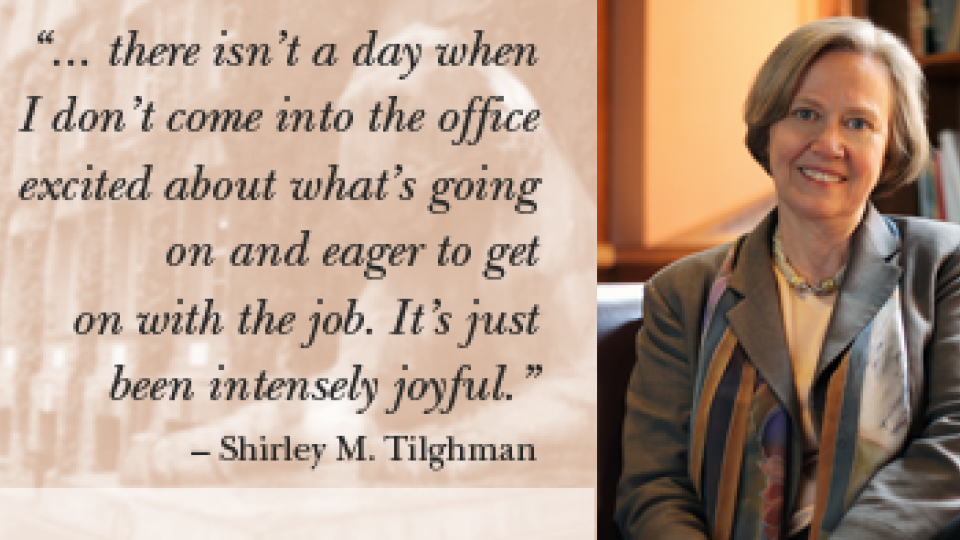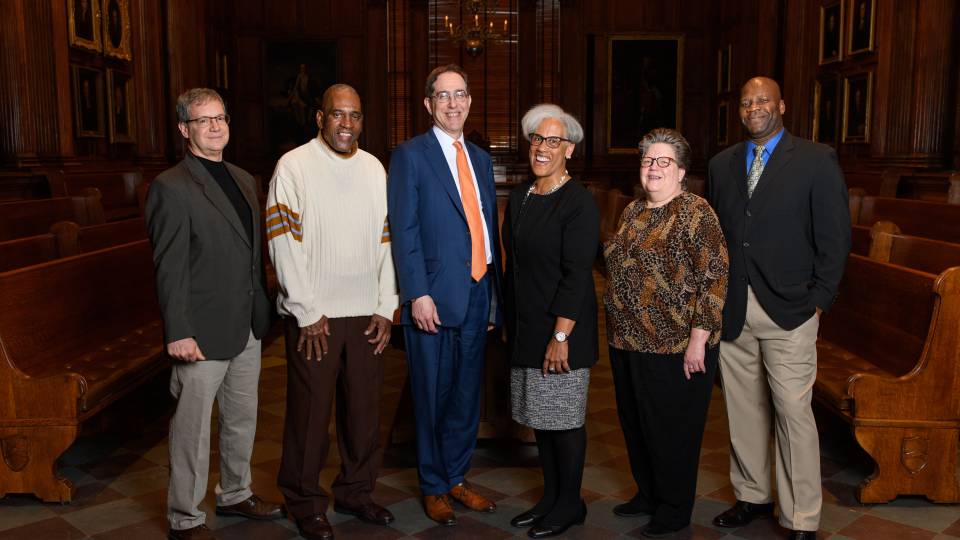From the Nov. 13, 2006, Princeton Weekly Bulletin(Link is external)
For Lianne Sullivan-Crowley, the vice president for human resources(Link is external), doing her job well means frequently putting aside the technological conveniences of modern life — the phone, the fax, the computer — and getting downright old-fashioned. When she wants to talk to someone, she goes to see them.
“I spend at least half my week in other people’s offices,” she said. “You have to get out and meet people, look them in the eyes and see all that stuff that only comes through in person.”
Since assuming her job in August 2005, Sullivan-Crowley has spent time visiting with staff members who work at the utility plant and on the grounds crew. She has attended the Academic Managers Group meetings and the gatherings of the heads of all faculty departments and programs. She has dropped by to chat with staff members who work in development, at the Princeton Plasma Physics Lab and in the Office of Information Technology.
“It’s a level of outreach these folks appreciate,” said Chad Klaus, the general manager for services in the Office of the Vice President for Facilities. “She has the ability to connect with staff members at all levels and from all backgrounds.”
Sullivan-Crowley is in offices and plants asking, “What does human resources do well?” and “What would you like to see us do?”
And she is encouraging every staff member in the Office of Human Resources to do the same.
“This is a relationship-based community, and we want a personal approach to human resources,” she said. “What we have to do is get out there and have people know us, so that when they run into a difficult situation — which is part of what human resources work is about — they are much more willing to hear our advice and know that we are there to support them.”
It was President Tilghman’s personal approach to running the University that drew Sullivan-Crowley, who has 20 years’ experience in human resources at educational institutions — including Smith College and Harvard University — to Princeton.
“Shirley Tilghman said that universities are fundamentally about people, and that hooked me,” Sullivan-Crowley said. “She talked about Princeton being world class for students and faculty, and that she wanted it to be the same kind of experience for the staff.”
The human resources office has set about enhancing that experience by offering extensive management training opportunities, improving benefits and adding programs that help make staff members’ lives easier. Sullivan-Crowley is passionate about running an office that gives staff members support in a myriad of ways.
“Because she is a very good listener, she understands what people here need and has implemented her vision for human resources in a way that’s relevant to Princeton,” said Claire Elson, director of human resources.
Sullivan-Crowley’s vision for the Office of Human Resources is of a place where help for all the issues it handles — benefits, compensation, staffing, employee relations — is easy to access.
“We want human resources to be transparent and understandable and logical to access,” she said. “We want staff members to know they can call any number or any person they want, and we’ll figure out how to get the answer.”
This month the office will distribute a brochure to University staff members that provides photographs and contact numbers for all human resources staff members, as well as a listing of the area in which they specialize. It also will have examples of questions that the office can answer, and direct staff to the people who can resolve those questions.
Executive Vice President Mark Burstein said, “Lianne’s experience at Harvard and Smith, plus her willingness to try to really understand Princeton, has made her transition to the University very smooth. With her leadership, investment from her staff, and support from the president and provost, it is likely Princeton will achieve its goal of having a high-caliber human resources department that provides employees and managers with the support they need.”
One of Sullivan-Crowley’s first initiatives was to implement a series of learning and development classes to teach management skills to staff members who wish to acquire them. More than 800 members of Princeton’s staff have attended at least one of the curriculum’s 27 classes, and 145 have enrolled in the Core Learning Curriculum and Management Development Certificate program.
Sullivan-Crowley also is concentrating on staff diversity. The management program recently added a course on “Leveraging Diversity,” and Sullivan-Crowley is set to bring on a manager of diversity and inclusion, who will work on retaining and recruiting a diverse staff.
Last month the office announced that the employee contribution for several health plans would be reduced, and the prescription drug plan deductible would be eliminated. The deductible change came about when several staff members in facilities approached Sullivan-Crowley while she was visiting their shop.
“The plan had a $230 yearly deductible for families,” Sullivan-Crowley explained, and several staff members wondered if it could be lowered. She brought up the issue with the University Benefits Committee, which found a way to eliminate the deductible.
Provost Christopher Eisgruber, who works closely with Sullivan-Crowley, said, “She cares about Princeton’s employees, she understands management and she knows how to persuade people to do the right thing. She also has a wonderful sense of humor that makes it a pleasure to work with her.”
Terri Harris Reed, vice provost for institutional equity and diversity, added, “Lianne’s listening skills and ability to quickly identify key issues have enabled her to make a significant impact very early in her tenure. She is tough but fair, and actively seeks the input of her colleagues — many of whom have come to rely on her good judgment.”
Last year, the University instituted a mortgage program to help low- to moderate-income employees reduce the cost of buying a home. Earlier this month, the University began offering a new program to all faculty and staff that addresses the needs of those employees and covers a group of employees not previously eligible for this benefit.
In addition, the new Backup Care Options program, implemented in March 2006, provides care for children, adults and the elderly when established care arrangements fall through. During its first six months, 117 faculty, staff and graduate students used the program (see related story(Link is external)).
Finding ways to help employees achieve a better work/life balance is an issue dear to Sullivan-Crowley’s heart. She has two daughters, 7-year-old Anne and 4-year-old Libby, with her spouse, Julie Sullivan-Crowley. Her position requires her to put in long hours, but “I always try to be home for dinner and putting the children to bed,” she said. On the weekends she enjoys bringing her daughters to campus for events like the P-rade, her favorite Princeton experience so far.
On the job, she is making another round of visits to offices across campus, ensuring that she has gotten input from as many people as possible.
“You can never stop asking, ‘Did we do that right? Are we doing this well?’” Sullivan-Crowley said. “I go in and say, ‘Give me feedback again.’”

